

Jack Boggis
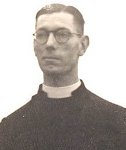 As
Jack explains below, Fr Groser was his inspiration for seeking
ordination (and Conrad Noël's Thaxted his theological Mecca). His mother was a Scots-born teacher, and he was to prove
an adept linguist; yet he says that he struggled with his training, at Knutsford (like Fr
Joe Williamson) and then (like Fr Groser) at Mirfield. He was ordained
deacon in 1932, serving with Fr Groser at Christ Church Watney Street
and editing the radical Christ
Church Monthly. In 1936, he went to Hamstead
in Essex (Dick Turpin's birthplace)
and then
as Sub-Dean [curate] of Bocking. There the former young commmunist
became Secretary of Braintree
Labour Party, as well as of its Anglo-Soviet Friendship Society, but
resigned from the party to lead ex-communist Tom
Driberg's
campaign for election as an Independent MP for
Maldon in 1942. Driberg in his colourful 1977
autobigraphy Ruling
Passions
described him as my most active and
useful supporter and a personal friend. From
1943 he was Vicar of St Peter's District Church in Becontree, before
returning to the East End in 1947 to succeed Fr Groser as Rector of at
St George-in-the-East in 1947.
As
Jack explains below, Fr Groser was his inspiration for seeking
ordination (and Conrad Noël's Thaxted his theological Mecca). His mother was a Scots-born teacher, and he was to prove
an adept linguist; yet he says that he struggled with his training, at Knutsford (like Fr
Joe Williamson) and then (like Fr Groser) at Mirfield. He was ordained
deacon in 1932, serving with Fr Groser at Christ Church Watney Street
and editing the radical Christ
Church Monthly. In 1936, he went to Hamstead
in Essex (Dick Turpin's birthplace)
and then
as Sub-Dean [curate] of Bocking. There the former young commmunist
became Secretary of Braintree
Labour Party, as well as of its Anglo-Soviet Friendship Society, but
resigned from the party to lead ex-communist Tom
Driberg's
campaign for election as an Independent MP for
Maldon in 1942. Driberg in his colourful 1977
autobigraphy Ruling
Passions
described him as my most active and
useful supporter and a personal friend. From
1943 he was Vicar of St Peter's District Church in Becontree, before
returning to the East End in 1947 to succeed Fr Groser as Rector of at
St George-in-the-East in 1947. Like
Fr Groser, he was a member of Conrad Noël's Catholic
Crusade until its demise in 1936, and of the Socialist Christian
League, as well as of the Council of Clergy and Ministers for Common
Ownership / Society of Socialist Clergy and Ministers. [See here
for
a an attempt to unravel the complex interplay between these and other
Christian Socialist groupings.] In 1947 he co-wrote the Socialist
Christian Catechism - note the word order - with Fr Gresham
Kirkby
[right], who had been his
curate in Becontree and was vicar of St Paul Bow
Common from 1951 to 1994, where his vision formed part of the brief for
the 1960 building by Maguire and Murray, voted the best modern church in Britain.
Pipe smoker, organist, activist and (he claimed) last survivor of the
League of the Kingdom of God since it had never been formally
dissolved, he died in 2006, aged 90 - here
is Ken Leech's obituary.
Like
Fr Groser, he was a member of Conrad Noël's Catholic
Crusade until its demise in 1936, and of the Socialist Christian
League, as well as of the Council of Clergy and Ministers for Common
Ownership / Society of Socialist Clergy and Ministers. [See here
for
a an attempt to unravel the complex interplay between these and other
Christian Socialist groupings.] In 1947 he co-wrote the Socialist
Christian Catechism - note the word order - with Fr Gresham
Kirkby
[right], who had been his
curate in Becontree and was vicar of St Paul Bow
Common from 1951 to 1994, where his vision formed part of the brief for
the 1960 building by Maguire and Murray, voted the best modern church in Britain.
Pipe smoker, organist, activist and (he claimed) last survivor of the
League of the Kingdom of God since it had never been formally
dissolved, he died in 2006, aged 90 - here
is Ken Leech's obituary. 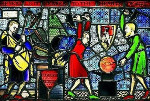 SOCIALIST CHRISTIAN CATECHISM SOCIALIST CHRISTIAN CATECHISM1. What is a Socialist Christian? A christian who works for an international, socialist order of Society. 2. Why does he work for this? Because he believes in the coming of the Kingdom of God on earth. 3. What is the Kingdom of God? An order of justice, love and peace, for whose coming on earth Jesus taught us to pray. 4. What other names are there for this New Order? The New Age, the Divine Commonwealth, the City of God which St John saw coming down from Heaven to Earth. 5. What do you mean by Socialism? Socialism is a system based on common ownership. 6. Why do Socialist Christians believe that the Kingdom of God demands a socialist order? Because common ownership is based on natural law, the revelation of the Bible and the Christian tradition. 7. Do Socialist Christians believe in the possibility of a socialist order? They believe that this is within the purpose of God, and is a necessary development out of the collapse of capitalism. 8. Do Socialist Christians believe in a particular form of socialism? They believe in a socialism which combines justice and freedom. 9. Have they any pattern for the emerging socialist order? They see the pattern in the holy and undivided Trinity, variety in unity and unity in variety, wherein none is greater or less than another and all are equal. Fundamental Beliefs • The earth is the Lord's etc; therefore God is the only Landlord • He has made of one blood all nations, and therefore they adopt as their banner the red flag of international brotherhood. • God was in Christ reconciling the world to himself, and therefore they strive to break down all that divides humanity. • Christ came to cast fire on the earth, therefore they look for the revolutionary purging of the empires of this world and the destruction of the forces of evil. • Through the death and resurrection of Christ the New Age has dawned; therefore they proclaim the good news of the Kingdom of God as a revolutionary religion. • Christ must reign until he has abolished all rule and all authority and power, and therefore they defy all tyranny wherever it is found. • The Spirit of God stirs men to revolution, and therefore they recognize in the movements of the people the working out of the divine purpose. • Only in holy fellowship can the life of man achieve its fullness, and therefore they seek to create among men free associations for the common good. • Sin mars all human aspirations and achievements, and therefore they recognize the need for forgiveness and grace. • The Kingdom of God on earth is a divine purpose for all creation; therefore they look beyond the coming of the Kingdom to the time when God shall be all in all. |
|
| Evils
Which Socialist Christians are Pledged to Fight 1. Property for power 2. The wage system 3. Imperialism 4. Racialism The Heresies' Principal Shrines Social Reformism, which bolsters up the capitalist system. Bureaucracy, which stifles initiative. Fabianism, which hands over control to the do-gooders. Dictatorship, which betrays the revolution. The Four Marks of Socialist Order 1. Common Ownership 2. Democratic Control 3. Decentralization 4. Free Association |
The Four Great Teachers [see below] Hancock, who proclaimed 'the banner of Christ in the hands of the Socialists'. Headlam, who taught that 'it is the Mass that matters'. Marson, who saw that the Church is 'God's co-operative society'. Noël, who gave us the people's Life of Jesus. The Traditions 1. The Brickmakers' Strike 2. The Year of Jubilee 3. Samuel on Monarchy 4. Elijah humbling Ahab 5. The Maccabean Struggle 6. The Jerusalem Collective 7. The Peasants' Revolt 8. The Tolpuddle Martyrs 9. The General Strike 10. The Red Flag Annual Festival: May Day Principal Shrine: Thaxted Parish Church, Essex |
| The
non-church-going masses have taken to churchgoing. We have seen what
journalists of Mammon and Caste call an invasion of the 'Churches by
poor Socialists. We have seen nothing else like it in our generation. This is the Lord's doing; and it is marvellous in our eyes … If some
old Athenian philosopher had risen from the dead ... had come into the
streets of London on Sunday and watched the great multitude surging
into St. Paul's Cathedral, they would naturally have asked, whose
disciples are all these men? What leader so they follow? From whom do
they derive the axioms and rules which are moving them? Have you, my brethren, looked at the banners of this 'mob'? Have you observed whose image and superscription they bear? It is not Caesar's, not Victoria's, not Gladstone's, not Schnadhorst's. not Hyndman's. You see that they carry banners with mottoes upon them. Who is the author of these texts which express the social faith of this huge multitude? From what teachers have they borrowed the dogmas which they call upon all the city to read and to respect, and to obey? On whose authority are these innumerable crowds of the poor and rough doing this unwonted thing? They, or a great many of them, call themselves 'Socialists'. Let us read what is on their banners; let us discover who is the ultimate dogmatist of this multitudinous sect. Christians, as you watch the mighty multitude pass by, you will soon be shaken out of your hasty a priori conjectures. Do you expect to read upon their banners wild words of their own invention? Do you expect extracts from Babeuf or from Proudhon, or even from Ferdinand Lasalle or Karl Marx? Are not the 'Socialists' their disciples? Ought not the mottoes by which they declare before the world their convictions, their demands, their faith, to be extracted from Das Capital or from the Arbeiterprogramm? Oh, come, all ye faithful! Look again and again at these inscriptions. Recognize, while you have time, what they are: see, clergy and laity, out of whose mouth the cries of the 'mob' have come. They are the words of your Master. They are the laws of the Eternal Father. They are the lessons which He taught us by His Son. They are the new commandments which you and I were pledged at our Baptism to keep. 'Feed My lambs! My house is a house of prayer, but ye (capitalists and landlords) have made it a den of thieves! ' was an hungered and ye gave Me no meat; naked and ye clothed Me not. It is a small matter to what sect or party this great 'multitude' fancies it belongs, or by what denomination it pleases to call itself. You can see to whom they have felt obliged to go in order to find the fullest expression of their faith. In the name of our God, said the crowds of the London poor, as well as the Hebrew psalmist, we will set up our banners. We have not seen in our generation any other such warning, any other such an acknowledgment, that Jesus Christ the Crucified is He whom the Father has exalted to be the Head of Humanity, to lift up an ensign for the peoples, to be the one and only all-sufficient mediator, representative, spokesman, and avenger of all that are desolate and oppressed. |
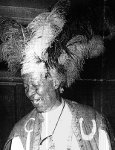 As his following profile of the
parish shows, Jack espoused many of the
traditional values and practices of the parish priest, whether urban or
rural - including visiting, and offering hospitality. Those who
remember his time here recall the unconventional unstuffiness of
rectory teas - where you helped yourself from whatever was on the table
(see below on Lotte's contribution to this ambience). One memorable
visit was that of the flamboyant Prince 'I gotta
horse' Monolulu (real name Peter McKay), a well-known East End
figure and horse racing enthusiast. Jack's daughter Celia (Cecilia), a
typesetter and designer for several small periodicals, and one-time
classified ads editor of Private
Eye, describes this visit in The Oldie for
January 1997 [text here]. The year after Fr
Boggis went to
Moscow with a group of clergy on a cultural peace mission, Prince Monolulu went
there to promote horse racing as the key to world peace!
As his following profile of the
parish shows, Jack espoused many of the
traditional values and practices of the parish priest, whether urban or
rural - including visiting, and offering hospitality. Those who
remember his time here recall the unconventional unstuffiness of
rectory teas - where you helped yourself from whatever was on the table
(see below on Lotte's contribution to this ambience). One memorable
visit was that of the flamboyant Prince 'I gotta
horse' Monolulu (real name Peter McKay), a well-known East End
figure and horse racing enthusiast. Jack's daughter Celia (Cecilia), a
typesetter and designer for several small periodicals, and one-time
classified ads editor of Private
Eye, describes this visit in The Oldie for
January 1997 [text here]. The year after Fr
Boggis went to
Moscow with a group of clergy on a cultural peace mission, Prince Monolulu went
there to promote horse racing as the key to world peace! The influx of
immigrants from the Caribbean and West Africa - alongside the Jewish
(by then in decline) and Roman Catholic presence, provided challenges
to which he rose, in consort with the Franciscans.
He was a member of the Movement for Colonial Freedom (founded in 1954
on the initiative of Fenner Brockway MP, with Harold Wilson, Barbara
Castle and Tony Benn, plus celebrities such as Benjamin Britten, as
members: known since 1970 as Liberation). Right
is Derek Bailey, thurifer at St George-in-the-Ruins during Fr
Boggis' time; he now lives in Colorado, where he enjoys ski-ing! Thanks
to Derek for this picture.
The influx of
immigrants from the Caribbean and West Africa - alongside the Jewish
(by then in decline) and Roman Catholic presence, provided challenges
to which he rose, in consort with the Franciscans.
He was a member of the Movement for Colonial Freedom (founded in 1954
on the initiative of Fenner Brockway MP, with Harold Wilson, Barbara
Castle and Tony Benn, plus celebrities such as Benjamin Britten, as
members: known since 1970 as Liberation). Right
is Derek Bailey, thurifer at St George-in-the-Ruins during Fr
Boggis' time; he now lives in Colorado, where he enjoys ski-ing! Thanks
to Derek for this picture.
| On January 11 the British Weekly [a long-established nonconformist newspaper] published an Open Letter to Professor Hromádka of Czechoslovakia questioning his position and that of the Hungarian Protestants. In the course of the letter they attacked a man called the Rev. Stanley Evans, whose critical faculties are emotional. They could not be intellectual. When [Evans] wrote a short letter in reply to their charges they neither published it nor acknowledged it; they did, however, print a reply from Professor Hromádka. They followed this by printing a reply from a distinguished Hungarian Calvinist lawyer, now an emigré in this country, whose words were so violent that the editor of the British Weekly himself felt compelled to say of it later: While we winced at both the matter and manner of parts of his reply, we printed it because it was an expression of opinion from a man who had only recently escaped from Hungary and was thoroughly informed. This violent document was then broadcast to Hungary by a Hungarian section of the BBC, whereupon Dr Imré Kádár, the Director of the Hungarian Church Press, a distinguished Hungarian who sees no cause to escape from his own country, wrote a reply to Sir William Haley, the Director of the BBC. When the BBC did not use this reply, Dr Kádár sent it to the British Weekly asking them to print it; they reacted by printing an article devoted to saying that they would not print it, including the interesting advice: Father Jack Boggis and the Rev. Stanley Evans are not your most effective or convincing advocates. Since Fr. Boggis has not been to Hungary, not written about Hungary and not spoken about Hungary, it is a little difficult to see why he has been singled out in this way. [Evans], having been unquestionably guilty of all these things, wrote personally to the Editor to ask whether or not he was prepared to print anything in reply and, receiving the princely allowance of 120 words ... |
Jack would in fact have known Stanley Evans well: he was a communist and Stalinist sympathiser (his address at a memorial service for Joseph Stalin in 1953 at St George Queen Square, for the Society of Socialist Clergy and Ministers, was much-criticised), but he moderated his views and after a period in the 'wilderness' following a series of curacies was appointed as incumbent of Holy Trinity Dalston in 1955. [This incumbency, as a 'back street pastor' (about which Fr Ken Leech has written) was such a success that he was appointed a residentiary canon of Southwark, and became a key figure in 'South Bank Religion' - a popular preacher, and speaker for the Campaign for Nuclear Disarmament - but this was cut short by his death in a car crash.]
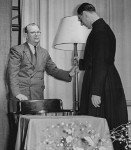
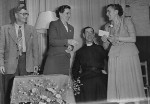 But to return to 1951: as well as his Russian involvements, Stanley
Evans was indeed actively involved in Anglo-Hungarian affairs, chairing
the British-Hungarian Friendship Society [a pressure group], and attended the
trial of Cardinal József Mindszenty, allegedly representing the Communist Daily Worker (so was
one of the few 'non-syndicated' press representatives present). Jack's
involvement in this cause - unless there is more to be discovered? - was far less active. Right are two pictures from his retirement: with Lotte, Edith Wyeth and Jim Desormeaux, and with Jimmy Wyeth.
But to return to 1951: as well as his Russian involvements, Stanley
Evans was indeed actively involved in Anglo-Hungarian affairs, chairing
the British-Hungarian Friendship Society [a pressure group], and attended the
trial of Cardinal József Mindszenty, allegedly representing the Communist Daily Worker (so was
one of the few 'non-syndicated' press representatives present). Jack's
involvement in this cause - unless there is more to be discovered? - was far less active. Right are two pictures from his retirement: with Lotte, Edith Wyeth and Jim Desormeaux, and with Jimmy Wyeth.
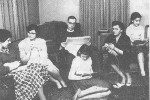 After
his time here, Jack spent a few years as vicar of All Saints
Hillingdon - at that
time a semi-rural parish on the fringes of the diocese of London -
where among
other things he served as secretary of Uxbridge CND [march left in 1960, with Canon
John Collins; right is
an undated picture of domestic life]. For his last five
years, because of a heart condition he took semi-retirement as
incumbent of a
group
of three parishes in Essex, near his
beloved Thaxted
- Broxted, Tilty
and Easton - succeeding Hugh Cuthbertson,
also a Thaxted devotee,
who had come to be the Vicar of St Paul Dock Street. (One of its
patrons was the sinologist John Cranmer Byng.) He died from
bronchial pneumonia in 1968.
After
his time here, Jack spent a few years as vicar of All Saints
Hillingdon - at that
time a semi-rural parish on the fringes of the diocese of London -
where among
other things he served as secretary of Uxbridge CND [march left in 1960, with Canon
John Collins; right is
an undated picture of domestic life]. For his last five
years, because of a heart condition he took semi-retirement as
incumbent of a
group
of three parishes in Essex, near his
beloved Thaxted
- Broxted, Tilty
and Easton - succeeding Hugh Cuthbertson,
also a Thaxted devotee,
who had come to be the Vicar of St Paul Dock Street. (One of its
patrons was the sinologist John Cranmer Byng.) He died from
bronchial pneumonia in 1968.
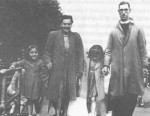
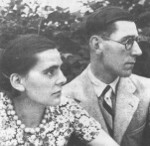 She met
Jack in London and was entranced by him even though he was rather English
(he never got to like pickled herring and sour cream!) He arranged his
days
off to take her around, including to Thaxted. There on St Stephen's Day
1932 she shared the eucharist with Jack and Conrad Noël.
They were
engaged secretly: she was on a limited visa, and on her return they
married at Christ Church Watney Street exactly a year later. They had
four girls - Christina, Bridget, Angela and Cecilia - and a very happy
family life. The Rectory was always full of visitors. There was
home-grown produce, though they did not keep animals here - that had to
wait until they moved out of town (and by all accounts was not an
unqualified success). Floors were
polished by walking around with rags tied onto slippers.
She met
Jack in London and was entranced by him even though he was rather English
(he never got to like pickled herring and sour cream!) He arranged his
days
off to take her around, including to Thaxted. There on St Stephen's Day
1932 she shared the eucharist with Jack and Conrad Noël.
They were
engaged secretly: she was on a limited visa, and on her return they
married at Christ Church Watney Street exactly a year later. They had
four girls - Christina, Bridget, Angela and Cecilia - and a very happy
family life. The Rectory was always full of visitors. There was
home-grown produce, though they did not keep animals here - that had to
wait until they moved out of town (and by all accounts was not an
unqualified success). Floors were
polished by walking around with rags tied onto slippers.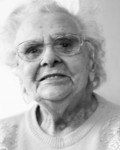
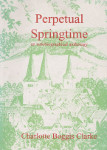 In
the years after her beloved
Jack's death, Lotte met and married Malcolm Clarke, a maths
professor who had been expelled from South Africa under apartheid. She
found fresh happiness, and they travelled the world, settling in
Newport
Pagnell. In 1992 Potpourri Publications produced Perpetual Springtime which Canon David Goldie, in the
foreword, describes as A
delicious mixture of stories about people and places, of poems and
thought-provoking pieces as a most attractive magazine of variety.
A revised edition is in prospect. Lotte has remained active into
her second century: here
is a peal of Bristol Surprise Majors at Newport Pagnell to mark her 100th birthday, and here is a remarkable radio
interview to mark her 102nd! In this, she describes coming to the East End as an
au pair to improve her
English, and finding it horrible
.... not very pleasant after her home town, but the people were so kind -
especially the churchgoers (plus the fact that she was a German speaker endeared her to Jewish residents).
Her husband, she says, made a point of wearing a cassock in the street,
to show he was a priest ... a clerk
in holy orders (how many clergy still use this accurate term?) Daily
walking and, until recently, swimming - despite having injured her neck
in a diving exam as a teenager - have kept her going, still living
independently, and an inspiration to all.
In
the years after her beloved
Jack's death, Lotte met and married Malcolm Clarke, a maths
professor who had been expelled from South Africa under apartheid. She
found fresh happiness, and they travelled the world, settling in
Newport
Pagnell. In 1992 Potpourri Publications produced Perpetual Springtime which Canon David Goldie, in the
foreword, describes as A
delicious mixture of stories about people and places, of poems and
thought-provoking pieces as a most attractive magazine of variety.
A revised edition is in prospect. Lotte has remained active into
her second century: here
is a peal of Bristol Surprise Majors at Newport Pagnell to mark her 100th birthday, and here is a remarkable radio
interview to mark her 102nd! In this, she describes coming to the East End as an
au pair to improve her
English, and finding it horrible
.... not very pleasant after her home town, but the people were so kind -
especially the churchgoers (plus the fact that she was a German speaker endeared her to Jewish residents).
Her husband, she says, made a point of wearing a cassock in the street,
to show he was a priest ... a clerk
in holy orders (how many clergy still use this accurate term?) Daily
walking and, until recently, swimming - despite having injured her neck
in a diving exam as a teenager - have kept her going, still living
independently, and an inspiration to all.John Groser, Man of God, by Jack Boggis (from The Christian Socialist no.32, May 1966)
|
The
passing of Father Groser means a great loss to Christian Socialism.
Many of us remember his great address at the inaugural meeting of
C.S.M. and his devotion to the Movement he helped to form and from
which he hoped so much. This tribute from Jack Boggis was originally
published in Cosmos
and
we are grateful to the Master of the Royal Foundation of St Katharine
for permission to reprint. At the time of my first meeting with John Groser, I was an atheist, and a member of the Communist Party. He and Jack Bucknell were then Assistant Priests at St. Michael’s Poplar, and were invited to speak to an outdoor meeting organised by the Central Southwark Labour Party. My father was the caretaker of the building which housed the Party Offices, and the Agent told me one day that two Communist priests were coming to speak, I remember well my scornful reply: 'There are no Communists outside the Communist Party!' But I went to the meeting, and a very queer do it was. Two tall priests in cassocks which had a sort of monk's cowl attachment, white silk mufflers instead of dog-collars, accomapnied by a number of young persons with a Crucifix, a Red Flag and a St. George’s Flag. They spoke: of the Kingdom of God on earth, and the kind of society Jesus wanted us to build, and I was very interested indeed. This was dangerous stuff: far more dangerous than the usual pie in the sky when you die dope against which I had rebelled soon after my Confirmation. I engaged in heated argument with them after the meeting had ended, One of my opponents was Charles Warner, now the Rector of Farnham Royal, who, on. hearing me boast that I was a member of the Communist Party, blandly assured me that he too belonged to a Communist organisation which had 400 million members; How many members has yours got? He was referring, I learned, to the Catholic Church, for the Ministry of which he was then preparing at Mirfleld. John and Jack, as we always called them, were members of the Catholic Crusade, and I was invited to their study group at Poplar, a very lively body of keen young people who discussed every aspect of the application of the Christian religion to the social, political and economic problems of the day. Through my association with this group, and particularly with Fr. Jack and Fr. John, I was led back to the Church and Sacraments, and it was Charles Warner who put me in touch with Mirfield, so that I was eventually able to follow the vocation I found through the Poplar group of the Catholic Crusade. From that time I enjoyed a friendship with John and Mary Groser and their family which has persisted through all these years, We were all members of the Crusade, and the theology and practice of that movement expressing itself in a truly revolutionary Christian Socialism, rooted in the Catholic Faith, and the richness of the fellowship nurtured by the common outlook and social life of the members, was to be our inspiration in later years in the poverty of Stepney in the hungry 30's. It is probably difficult for many people today to realise the almost total inadequacy of the education received at an Elementary School by a lad who left in 1919 at the age of 14 to go and work for his living, as a preparation (academically at least) for the Ministry of the Church. Mirfield sent me to Fr. Hand's Ordination Prep. School in Norfolk to see whether I could learn enough in one term to justify Fr. Hand in recommending that I go on to Knutsford to take Matric. in one more year. I knew nothing at all of Greek or Latin, practically nothing of Algebra, and not very much of anything else. Had it not been for the constant encouragement of Fr. John, and the zeal for the Church and the Kingdom of God which he had imbued me, I do not think I could have done it. And, should these words be printed, and meet Mary's eye, let it be known that when I say 'Fr. John', I always mean Mary too. Their home was always open to me, and I was sustained by the patient wisdom of Fr. John and the Christian love of their household. While I battled on to defeat the examiners at Knutsford, Leeds and Mirfield, Fr. John fell on bad times. He was in the tradition of the Apostles who had been accused of "turning the world upside down", (or right side up, as we used to say) and although never what is meant by the term 'communist', he was a revolutionary. Such are never really popular in the modern Church, and Fr. John was regarded by many in authority as a 'pestilent priest'. Perhaps Cosmos will one day print an article on the diminution, if not the extinction, of the prophetic voice in the Church of today. At any rate, Fr. John was persecuted. The word is not too strong. After leaving St. Michael's, nothing was offered to him for a very long time. He ate the bread of charity, which, although offered with love, can be bitter to eat, and for a priest of his calibre to be deprived of opportunities of fulfilling his vocation is a soul-wounding experience, besides being a great loss to the Church. After threatening that he would have to apply to the Poor Law for relief, he was at last made priest-in-charge of the almost derelict Christ Church, Watney Street in Stepney. A Commission had, I believe, been sitting to decide whether it should be closed altogether, but within six months, Fr. John had built up a local congregation around a nucleus Crusaders and their friends from East London. When I left Mirfield, he gave me my Title, and trained me in the work and discipline of a priest. Each day began with Mass, and all our work was based upon regular prayer and intercession, He was a great believer in visiting, and woe betide me if I was in the house between 2 p.m. and 5 p.m. on any day. The people loved him. He was resolute to the point of obstinacy in many ways, and yet lie had a heart of compassion such as I have never met since. None of us could fail to be deeply moved by the incredible poverty of those days of mass unemployment, of the cruel means test, and the bullying Relieving officers, and the extent of Fr. John's personal and private charity cannot even be guessed at. I know we lived at a standard which any working class family of today would regard as insufficient, and Mary, I'm sure, gathered a few grey hairs as she tried to spread her housekeeping allowance, not only to supply us, but a large number of people who had to be fed; beggars who called at the door were never sent empty away, but given a meal and a 'chit' for a bed at the Church Army Hostel. The heart of Fr. John's religion, in its social aspect, was that nothing is more important than a person. He tended to avoid such phrases as 'living souls', because it is so easy to forget that 'living souls' have bodies which need to be fed, clothed, and housed. So he fought for these things for them. The Gospel was not confined to the church, but carried into the streets, where regular open air meetings were held where we proclaimed the Christian Socialism we believed (and which I still believe) could solve the problems of poverty. A book could be written of those days of the General Strike, when Fr. John wanted to obtain peaceful access by some striking dockers to the building in which their leaders were meeting, so that the men could hear whatever announcement should be made. He shouted his request to the Inspector in charge of the two rows of police lined up across the road, was beckoned forward, and struck down by a policeman's baton as soon as he readied them. The police then charted the peaceful strikers, arresting several, and next day at Thames Police Court, produced a trunk load of bits of iron piping and so on which they said they had taken from the men. I was not there, but I accept Fr. John's word that this was a 'frame-up'; Or of when he, enraged by the activities of the Police in arresting inoffensive unemployed men on the charge of 'loitering with intent to commit a felony', dressed himself in his oldest clothes and peered into several parked cars in a highly suspicious manner in order to get himself arrested; Or of the welcome in the Parish Hall to the footsore Hunger Marchers; Or the great Rent Strike, when Fr. John had over £5,000 of unpaid rent in his account: the list of possibilities is endless, and all of them sprang from his intense compassion and love of persons. I left him to continue my ministry elsewhere, but we kept in touch, and I heard of his activities during the war years. Christ Church was destroyed and Fr. John and his staff transferred to nearby St. George-in-the-East to carry on the work they had been doing among the people who slept in air raid shelters night after night: a ministry of Compline, comfort, and cocoa which sustained and cheered many a weary body and frightened soul. When the war ended, he went to St. Katharine's and I followed him as Rector of St. George's: no easy task. If I did not utterly fail, it was because of the foundation Fr. John had laid at St. George's, and in me. He was the complete Parish Priest: a man of prayer, a convincing preacher, a true Father, a lover of persons. The Church is the poorer by his going, and many will feel a. sense of grievous personal loss, for he was indeed a 'man, greatly beloved' and deservedly so. May he rest in peace. |
Back to History page | Back to St George-in-the-East Clergy 1900- | Back to St John Beverley Groser